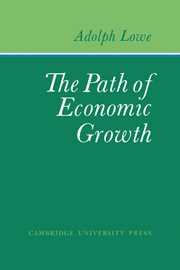Book contents
- Frontmatter
- Contents
- Preface
- Acknowledgments
- PART I The Basic Model
- PART II Changes in the Rate of Change
- PART III Changes in the Rate of Change
- PART IV Changes in the Rate of Change
- 21 The Scope of the Investigation
- 22 Dynamic Equilibrium Once More
- 23 Nonneutral Innovations: A General Survey
- 24 Pure Labor-Displacing Innovations
- 25 Pure Capital-Displacing Innovations
- 26 Some Comments on Combined Changes in the Input of Labor and Capital
- 27 Technical Progress and Diminishing Returns
- 28 Some Concluding Remarks
- Appendix: An Alternative Presentation of Lowe's Basic Model
- Glossary of Recurring Symbols
- Name Index
- Subject Index
27 - Technical Progress and Diminishing Returns
Published online by Cambridge University Press: 07 October 2011
- Frontmatter
- Contents
- Preface
- Acknowledgments
- PART I The Basic Model
- PART II Changes in the Rate of Change
- PART III Changes in the Rate of Change
- PART IV Changes in the Rate of Change
- 21 The Scope of the Investigation
- 22 Dynamic Equilibrium Once More
- 23 Nonneutral Innovations: A General Survey
- 24 Pure Labor-Displacing Innovations
- 25 Pure Capital-Displacing Innovations
- 26 Some Comments on Combined Changes in the Input of Labor and Capital
- 27 Technical Progress and Diminishing Returns
- 28 Some Concluding Remarks
- Appendix: An Alternative Presentation of Lowe's Basic Model
- Glossary of Recurring Symbols
- Name Index
- Subject Index
Summary
Up to this point we have strictly adhered to the methodological principle enunciated at the beginning of our deliberations about technical progress. We have treated innovations as independent variables, the operation of which is supposed to distort a preexisting dynamic equilibrium. Our task has been to determine the responses of the system suitable to adjust it to the technological stimulus. Now we are going to change the focus of our investigation by treating innovations themselves as part of the response of the system – a device for counteracting the effect of diminishing returns in the area of natural resources and for restoring the initial per capita output.
This change in focus implies, first of all, a specification of the macrogoal which, in our previous analyses, served as the guidepost for all adjustment processes. It is no longer a process of production moving in dynamic equilibrium generally, but a process that achieves and maintains a preordained level of per capita output of consumer goods. Second, deviations from this stipulated level in the downward direction are supposed to induce innovations sufficiently productive to compensate for any decline of returns. Such inducement is conditional on the operation of a motorial mechanism, that is, on the presence of behavioral and motivational patterns that will assure innovating activity of the right size at the right time. Third, this motorial mechanism can be set in motion only if, at the outset, a set of blueprints (inventions) is available from which one or more goal-adequate ones can be chosen as innovations.
Information
- Type
- Chapter
- Information
- The Path of Economic Growth , pp. 275 - 284Publisher: Cambridge University PressPrint publication year: 1976
